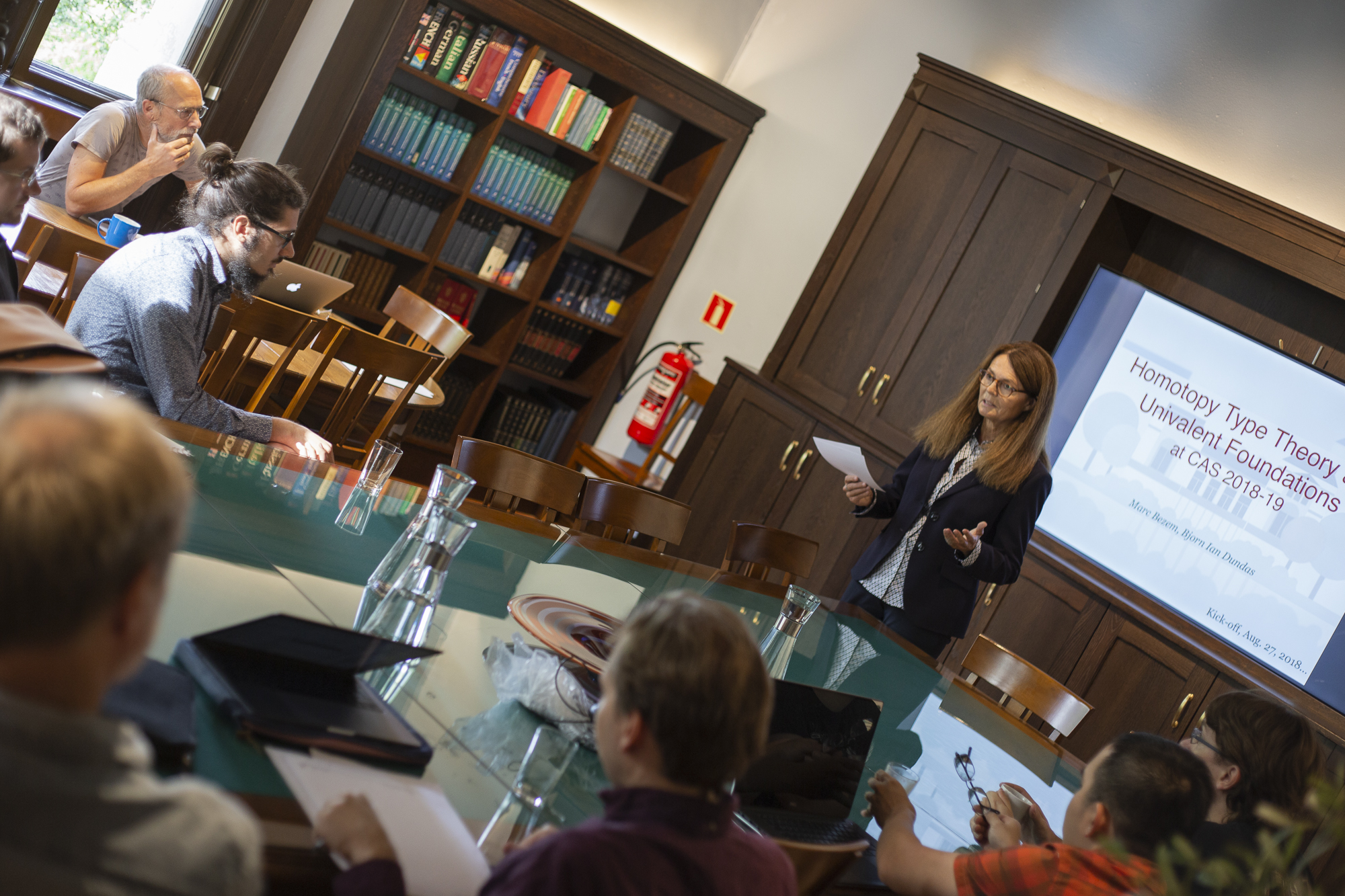Meet the Scientific Director

Camilla Serck-Hanssen wants more scholars to experience their ‘eureka moment.’
Serck-Hanssen, professor of philosophy at the University of Oslo (UiO), this month began her tenure as the sixth scientific director in the history of the Centre for Advanced Study (CAS). In the flurry of welcoming this year’s CAS fellows and adapting to the new position, Serck-Hanssen is looking ahead to make her mark on the Centre.
‘I want to strengthen the collaboration with our partner institutions, increase the number of strong applications, and grow the demographic diversity of our applicants,’ Serck-Hanssen said in an interview. ‘I also want to reach out to potential new partner institutions, and look at giving our alumni an opportunity to apply for research funding from CAS. That’s my ambition.’
On a day-to-day basis, Serck-Hanssen said she will work to recreate the atmosphere that she herself enjoyed as a CAS fellow for every scholar who arrives at the Centre.
‘Fundamental research, the way I see it -- and the way we approach it at CAS -- is giving these outstanding scholars a year of unlimited time and generous funding so that they can sit and concentrate on issues and topics that spring out of their own work,’ she said.
Eureka moment
Serck-Hanssen was one of two leaders of the CAS project Disclosing the Fabric of Reality - The Possibility of Metaphysics in the Age of Science, which was housed at the Centre during the 2015/16 academic year. That’s also when she had her eureka moment.
‘Naturally this is where I had my breakthrough,’ Serck-Hanssen said. ‘I remember just sitting here, and then suddenly -- eureka! The solution that everyone thought was over there wasn’t there. It was over here.’
Serck-Hanssen attributed the breakthrough to the uninterrupted time for research that her one-year stay at CAS provided her. Prior to solving the problem, she said it had vexed her for at least a decade.
‘When you work on a problem long enough, your subconscious keeps wrestling with it even when you’re not focused on it,’ Serck-Hanssen said. ‘At some point, the solution will come to you. But you almost never have the time for that in a regular university setting, because you’re teaching, you’re grading, you’re in meetings, you’re doing all kinds of other tasks.’
After leaving CAS and returning to UiO, Serck-Hanssen said that she found herself missing the days when she would barely make it through the front door of the Centre before immediately launching into an engaging, caffeine-fuelled academic conversation with one of the other fellows.
‘That’s the atmosphere we’re going to promote,’ Serck-Hanssen said. ‘I hope and expect that this is what our fellows are looking for.’
Post-CAS success
The stay at CAS served as the launching pad to a new period in Serck-Hanssen’s career. First a proposal for a Centre of Excellence -- a long-term funding scheme offered by the Research Council of Norway (RCN) -- that she and a group of colleagues submitted reached the final evaluation round. Then in January 2016, she and two other colleagues at UiO were awarded a five-year FRIPRO Toppforsk grant by the RCN for their project Conceptual Engineering.
Becoming scientific director doesn’t mean Serck-Hanssen will take a break from her own research, however. She has reserved one day a week for the duties of ensuring that the Conceptual Engineering project continues to operate smoothly, while the rest of her time will be spent at CAS (though she admitted that she is ‘probably going to be doing some research every now and then when I’m at CAS, too’).
The career move reflects a shift in Serck-Hanssen’s own priorities as a scholar, she said.
‘At this point in my career, I find it even more satisfying to work in a team, achieve results together, and help others succeed than achieve something on my own,’ Serck-Hanssen said. ‘I was reminded of that when I was here as a group leader -- how much joy it brings me when I can help someone else succeed. It’s really rewarding.’
Serck-Hanssen said the position of scientific director also appeals to her fondness for tackling new challenges. She said she considers herself ‘something of an entrepreneur’ -- and she has the resume to prove it. In addition to being a professor of philosophy who has tackled ethical issues as the leader of the Norwegian Defence Ethics Council and a member of the Norwegian Press Complaints Commission, Serck-Hanssen is also a farmer and ‘lumberjill.’
‘I think it’s a little depressing to think about not trying anything new,’ Serck-Hanssen said. ‘I don’t think I was meant to be a solitary scholar.’
Lessons from leadership
As a former CAS project leader, Serck-Hanssen recommended that this year’s project leaders pursue a ‘careful balance between open-endedness and structure’ as they navigate the academic year ahead.
‘On the one hand, you should be open to the possibility of exploring new research avenues, themes, and methods that you never imagined you would work with,’ Serck-Hanssen said. ‘On the other hand, you also need to pull on the reins every now and then to ensure that you spend your time wisely.’
Perhaps most importantly, she said, project leaders should not be surprised if they end up diverging from their carefully made plans for the year, and that the outcomes and takeaways from their time at CAS could be different -- though no less beneficial -- than they had thought.
‘Research can be unpredictable,’ she said.